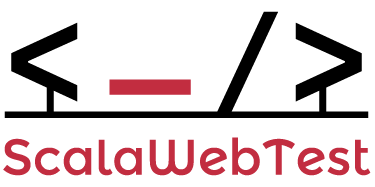ScalaWebTest is a library for writing ScalaTest/Selenium based integration tests for websites. It helps you with your basic setup and provides a new and very efficient approach to testing.
In manufacturing it is common to use gauges (also called checking gauges or testing gauges) to verify whether a workpiece meets predefined criteria and tolerances. ScalaWebTest transfers this concept to the world of web integration testing. You can define a gauge in HTML, and use it to verify your web application. This greatly improves the readability, simplicity of your integration tests.
Read the full documentation on our website http://www.scalawebtest.org
- Java 8
- Sbt 0.13.x
Get familiar with the sbt build tool because this is used to manage the project.
See Getting Started Guide here: http://www.scala-sbt.org/0.13/docs/Getting-Started.html
#> sbt compile test package
#> sbt inttest
This will start a Jetty server, executes the integration tests and stops the server again.
If you would like to run the Jetty server and in parallel work on integration tests and some code changes, you can do the following:
# Enter the sbt console first, enter 'sbt' in root folder
#> sbt
# Start Jetty server
#sbt> jetty:start
# Or if you would like that sbt automatically restarts Jetty after code changes then do:
#sbt> ~jetty:start
# Open separate command window and enter the sbt console again
# Run a single integration tests
#sbt> it:testOnly org.scalawebtest.integration.gauge.ContainsSpec
Create the following file ~/.sbt/0.13/plugins/gpg.sbt
Add the following line to gpg.sbt
addSbtPlugin("com.jsuereth" % "sbt-pgp" % "1.0.0")
Copy the private key (Sonatype PGP Private and Public Key from our company password store), to ~/.sbt/gpg/secring.ast
Create the file ~/.sbt/0.13/sonatype.sbt
Add the following content and replace username, password
credentials += Credentials("Sonatype Nexus Repository Manager",
"oss.sonatype.org",
"<your username>",
"<your password>")
The release process of ScalaWebTest is currently done manually. The process is done as follows:
- Switch the version in
build.sbtto that which is to be released (e.g. from0.0.1-SNAPSHOTto1.0.0) - Commit your changes with the commit message "Release x.x.x" (e.g.
Release 1.0.0) - Tag this commit with the release version
- Push you changes and the tag
- In your command line type in the following:
- the long way:
sbt- enters the sbt interactive mode r.+ clean- deletes all generated files (target)+ compile- compiles the main sources+ inttest- compiles and run the integration tests+ publishSigned- creates all of the below plus the poms- Enter the Sonatype PGP Key Password as stored in our company password store
- Go to https://oss.sonatype.org/#stagingRepositories verify and close the staging repository
exit- exits the sbt interactive mode
- the long way:
- Switch the version in
build.sbtto the snapshot version (e.g. from1.0.0to1.0.0-SNAPSHOT) and update the documentation if needed - Finally commit those changes with the commit message "Release x.x.x complete" (e.g.
Release 1.0.0 complete)
